Three Keys to Creating a Healthy Keyword Strategy
When I first got involved in SEM and SEO, I did not understand the importance of quality keywords and key phrases. Like many others who are starting out, I went for a large net approach seeking broad keywords with high traffic possibilities instead of seeking more of a niche keyword base that would actually reach the customers who were looking for exactly what my brand had to offer. What this did was allow for the stuffing of keywords that did not exactly match our content as well as create Google Adwords campaigns that brought a high return on hits but not conversions. This can get pretty dangerous if you are working with a high bid campaign in Adwords. Working with multiple campaigns in the past, I’ve learned that quality over quantity is a rule of thumb when it comes to SEM but you can be a bit sloppy with SEO and still get a high gain on long strand key phrases. During this topic I’m going to use Apostolic Clothing as a point of reference.
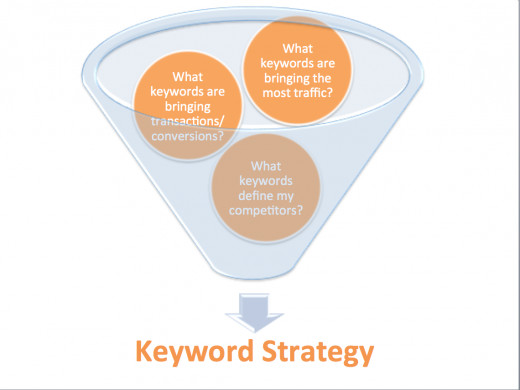

#1. What Keywords Are Bringing the Most Organic Traffic
I believe this must be among the first questions you should ask yourself about your client/company. When I was working on an SEO campaign for Apostolic Clothing, before we focused on the niche that made us different from every other clothing company we had to first figure out who was our number one purchasers and promoters and where were they coming from. This can be done easily by using Google Analytics and Webmaster Tools. An easy way would first be to have an Analytics account that has e-commerce tracking on (if you sell a product online). If you are more of an information site that is focused more on "goals" rather than "transactions," you can do this without e-commerce tracking. Once your analytics account is made, you can use it to verify your Webmaster Tools account. Google will ask you to verify ownership of the site and your Analytics account can work as a verification.
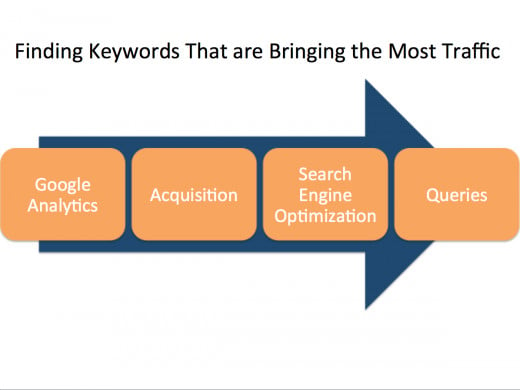
Finding Top Organic Keywords
Now that you have set up Google Analytics and Webmaster Tools, you now can run a query (this is based on the fact that you actually gave it a few weeks to populate). After you've logged into Google Analytics, go from Acquisition to Search Engine Optimization to Queries (see image - images always make life easier ;)). From this report you can adjust the view by the amount of clicks to see where most of your search customers are coming from. Not only will this give you the amount of click but also the CTR (click-through rate or the average percentage of people who click your site while seeing it in the search results) and your ranking of that keyword. If your taking anywhere from 1-7, your most likely going to appear on the first page of search engines, if you are not, it gives you something to work towards! This report can also be pulled up in Google Webmaster Tools simply by going to "Search Traffic" clicking on the "Search Queries" tab. If you have an Adwords account, you can view both Organic (non-paid) and Paid (Adwords) traffic. this really helps to view on a weekly basis to make sure your not throwing money away or waisting your time on bad keywords. Its just as important to be able to know how many hits a keyword is bringing your site as well as how many hits a keyword/phrase is NOT bringing. You may be selling vintage watches but find that your hits are all coming from a "LED watches" search. You may be getting a lot of hits, but your bounce rate (rate of people who leave your site almost immediately) will be very high. The topic of discussion is Quality vs Quantity
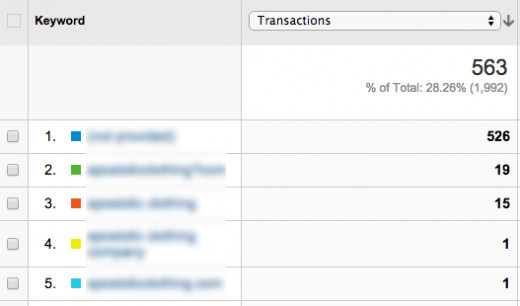
#2 What Keywords Are Bringing Transactions
Checking on keywords that bring return will give you one of the best advantages in creating a keyword strategy with quality keywords. These will usually reveal the niche you need to make sure you find the customers who are looking for your service. To find these keywords, there are quite a few ways of doing this but the easiest and free tool to use would be Google Analytics. If you are still inside Google analytics here are the steps to view a transaction report:
- Go back to the “Acquisitions” tab and scroll down to “Campaigns.”
- From that tab you will see “Organic keywords” if you have a paid campaign or simply “keywords.”
- Once inside this report, there will be a list of icons towards the top of your results on the right. One of those icons will be a pie chart and represents a "percentage" report. Click that icon and sort the report by transactions and it will show you what keywords are giving you a good return and what you may want to focus on.
This will also help you to find out what keywords are not performing and up your SEO campaign a bit. If you are a branded company (which usually you are), your brand should be your #1 keyword that is bringing traffic based on peoples knowledge of who you are and it will typically score between 1-3 in rankings if your branded correctly. The keywords under that will reveal your niche and what is you will need to focus on.
#3. What Keywords Are My Competitors Using
When you are a new company it is very hard to look up proper metrics for a keyword strategy because no one really knows that you are online so the metric reporting can be misleading due to not enough information just simply non-existent. On the flip side - maybe you have strong metric reporting but feel like your missing some terms or a niche. These three tools are perfect for not only getting a great hand on anchor text and keywords that are driving traffic to your site but also keywords that are driving traffic to competitors' sites. Unlike Google Analytics - you do not need to verify ownership of a website to see its metrics with these free tools:

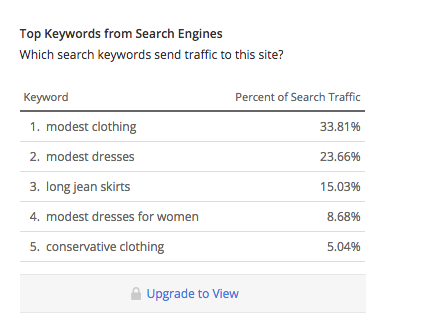
Alexa.com
The first way to do this would be by checking on Alexa.com. This is an amazing site that helps you see the ranking of your website globally and nationally as well as getting a quick look at the top five keywords (for free) driving traffic to your site. You can register for an upgraded account to get more insight but those top keywords will usually cover over 60% of your search engine traffic. It also gives bounce rates and a few other metrics for free such as the percentage of traffic that actually comes form search engines. If you have a low percentage but high ranking, I would usually guess that you have a strong social presence. If you create a paid account, you can begin to access social metric reporting as well.

Ahrefs.com
Ahrefs.com is another perfect and free tool that is mainly used for tracking the backlinks and site ranking of any website. What they specialize in is letting you know what sites are talking about you and linking to you and what anchor texts are doing the best as far as linking sites to yours. Anchor text is the clickable text in a hyperlink. For best return on an SEO standpoint, its best to make the anchor text about the page its linking to to earn scores with bots. Knowing this, you can see what anchor texts your competitors are using within their site or affiliates to talk about themselves. This can really help you get a standpoint on keyword ideas and places to focus on within your own network of backlinks or keyword strategies.

If you have the time to crate a free account with Ahrefs, you can view a lot more information and run multiple reports on competitors or on your own website to see if your back linking strategy is working well or if you need to pick up the pace a bit. I am still of the belief that you can rank great simply by having some great back linking on your website but that’s another discussion.

Sem Rush
This has got to be one of my all time favorite tools in creating a competitive keyword campaign. SEM rush offers their services for free but you can only do - i believe - five queries/day. You can buy into a pro account for unlimited use and I would say its highly worth it. If you find yourself in a situation where you do not know who your competitors are, this tool will not only give you your top keywords, but it will list who your organic competitors are as well as who your paid (if you have a Google Adwords account) competitors are. This is information that would otherwise take some major digging to pull up this type of reporting. Im my opinion, this tool alone can create a great list of strategic keywords simply by doing a report on yourself and multiple reports on who are defined as your competitors. This will give you the organic and paid keywords your competition is using as well as who are competing against them.
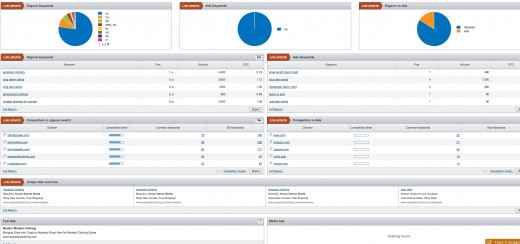
Make it Happen!
These tools will definitely give you what you need to make a strategic keyword campaign. Once you know what keywords you need to use, work on making sure they are in your content, anchor text, social media, h1 tags, etc. Please comment if you have any tools you would like to share or ideas thanks!








